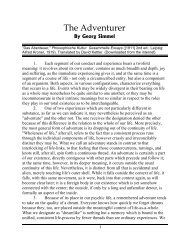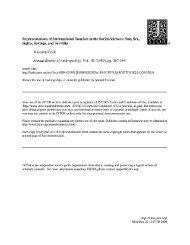The Maya Uay K'ot - OSEA-CITE
The Maya Uay K'ot - OSEA-CITE
The Maya Uay K'ot - OSEA-CITE
You also want an ePaper? Increase the reach of your titles
YUMPU automatically turns print PDFs into web optimized ePapers that Google loves.
I just learned it and I have never done anything evil.... Only on occasion do I go looking for merchandise....<br />
Eso es lo que hago, pero ese señor que lo descubrí, tenía un comercio de pura lozanía.”[R: ¿De puro que?]<br />
This is what I do, but this man I discovered, he sold pure luxury goods.” [R: Pure what?]<br />
De pura lencería. Ah, entonces en ningún lado encuentran esas cosas que tiene el ... no se veo.<br />
Pure linen and lingerie. Ah, back then you didn’t find the things he had anywhere ... they weren’t seen.<br />
El va por extranjero, pero asi lo trae cargado. Y nunca se vio que se estaciona un coche en la puerta de<br />
He goes abroad, but brings them back like this. Nobody ever saw him park a vehicle in front of the<br />
la lencería. Cuando se abre la casa está lleno de puras cosas así ... Le dieron su libertad ... No le<br />
clothing store. When they opened the house it was full of things like this... <strong>The</strong>y let him go ... <strong>The</strong>y<br />
hiceron nada. Porque el confesó que no era para hacer daño. Que el iba al extranjero a comprar mercancias.<br />
didn't do anything. Because he claimed he didn’t cause harm. He went abroad [simply] to buy merchandise.<br />
IV. Discussion<br />
A. Primitive Accumulation<br />
In this version, and other versions of Way Kot/Way Pop, the myth begins by<br />
posing a solution to a specific problem; however, the problem it purports to solve is not<br />
identified until the very end when the narrator notes the mysterious character of the<br />
clothing store (lencería). Although no one ever sees a delivery being made, the store is<br />
always stocked with costly and unusual goods. Where does this merchandise come from?<br />
Moreover, how does a merchant who doesn't engage in productive labor, or directly<br />
exploit the labor of others, amass such great wealth? <strong>The</strong> problem, of course, is a familiar<br />
one. It is the same problem Peter Worsley identified in his study of cargo cults, and the<br />
basis for the imitative magic he described in <strong>The</strong> Trumpet Shall Sound. “As far as the<br />
natives are concerned,” writes Worsley, “the Whites received the goods by steamer from<br />
unknown parts; they did not manufacture them, and merely sent pieces of paper back<br />
...Who made these goods, how and where were mysteries – it could hardly be the idle<br />
White man” (1986: 97).<br />
<strong>The</strong> <strong>Maya</strong>n solution, however, is a bit more “sociological” than the New Guinea<br />
one. In the tale of Way Kot the merchant, in the guise of a large bird, emanates directly<br />
from the foreman, an individual well-known for his ability to appropriate the labor power<br />
of others. Known in Yucatán as the mayokol, 3 the foreman was an anathema in the eyes<br />
of the <strong>Maya</strong> labor force. Although a native <strong>Maya</strong> speaker, he served the hacienda owner,<br />
a demonic figure, by enforcing production quotas and meting out corporal punishment to<br />
<strong>Maya</strong> workers (xxxx). In other versions of the tale (see page 32), the foreman is replaced<br />
by a priest, another well-known usurper, 4 but the outcome is the same.<br />
<strong>The</strong> tale of Way Kot also resembles the treasure tales told by the peasants of<br />
Tzintzuntzan, tales which were used to explain a resident’s sudden rise to prominence.<br />
Indeed, most of Foster's treasure tales (1967: 146-47), though purportedly examples of a<br />
general world view (e.g., the idea of limited good), deal specifically with the genesis of<br />
mercantile capital:<br />
1. Salvador Enríquez was a potter, so poor he lacked animals to carry clays. Like other<br />
poor potters, he packed his raw materials on his back, and his tumpline had worn all the<br />
hair off his head, he was that poor before he began to live well. His daughter, after cutting<br />
8




